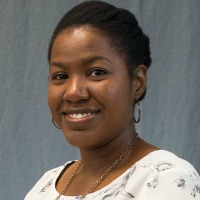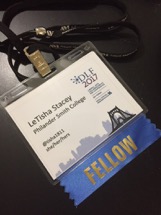
LeTisha Stacey (@tisha1811) is currently a Digital Librarian/Archivist at Philander Smith College and attended the 2017 DLF Forum as an HBCU Fellow. The award, which brought 24 fellows to the conference, was part of a collaborative effort with the HBCU Library Alliance, supported by a grant from IMLS.
The Digital Library Forum was the most informative and well organized conference that I have ever attended. I’m so grateful to the sponsors and the HBCU Library Alliance for making these fellowships available to information professionals at smaller colleges like mine. The Sched app, the suggestions from my DLF mentor, and the helpful conference volunteers made my first trip to the Forum very enjoyable and easy to navigate.
There was a wide variety of speakers who covered a myriad of topics: from metadata and digital humanities projects to gentrification, library labor issues and more. But my lasting takeaway from the Digital Library Forum was the sense of how resourceful the library community is and how well we adapt to this ever changing digital world we live in. If there isn’t an application to do what you need, develop it with open source tools! If you don’t have the funds to purchase equipment for a digitization project, pursue grant funding, build a DIY scanning system or collaborate with another institution to pool your resources!
 I’m so glad that I heeded the advice of my mentor, who suggested that I make it a priority to attend the Lightning Talks and Topic+ sessions so I could hear from multiple presenters in a single sitting. One of the reasons why I wanted to attend the DLF forum was to try to find frugal solutions to further the Philander Smith College Digital Archive Project, so during one of the first Lightning talks, I was very excited to see a 90 second talk about the “Impost Scanner” that costs a little over $100 to build. We have some fragile manuscripts and oversized items that cannot be scanned on the flatbed book scanners that we have, and we don’t have the budget to outsource the work, so learning about Jacob Levernier’s plans for a low cost books scanner (with a cradle) was a big encouragement for me. And although I missed the Publishing + session, I was still able to access the presentation slides for “Introducing Humanities Commons: Open Access, Open Source, and Open to All” on the Forum repository so I can learn more about the Humanities Commons project and the “Commons in a Box” software that could be used to establish a campus wide repository for born-digital works.
I’m so glad that I heeded the advice of my mentor, who suggested that I make it a priority to attend the Lightning Talks and Topic+ sessions so I could hear from multiple presenters in a single sitting. One of the reasons why I wanted to attend the DLF forum was to try to find frugal solutions to further the Philander Smith College Digital Archive Project, so during one of the first Lightning talks, I was very excited to see a 90 second talk about the “Impost Scanner” that costs a little over $100 to build. We have some fragile manuscripts and oversized items that cannot be scanned on the flatbed book scanners that we have, and we don’t have the budget to outsource the work, so learning about Jacob Levernier’s plans for a low cost books scanner (with a cradle) was a big encouragement for me. And although I missed the Publishing + session, I was still able to access the presentation slides for “Introducing Humanities Commons: Open Access, Open Source, and Open to All” on the Forum repository so I can learn more about the Humanities Commons project and the “Commons in a Box” software that could be used to establish a campus wide repository for born-digital works.
I can’t say enough about how impressed I was with this event. It was wonderful to meet so many people who are dedicated to sharing information and developing solutions to progress scholarship across the globe.
